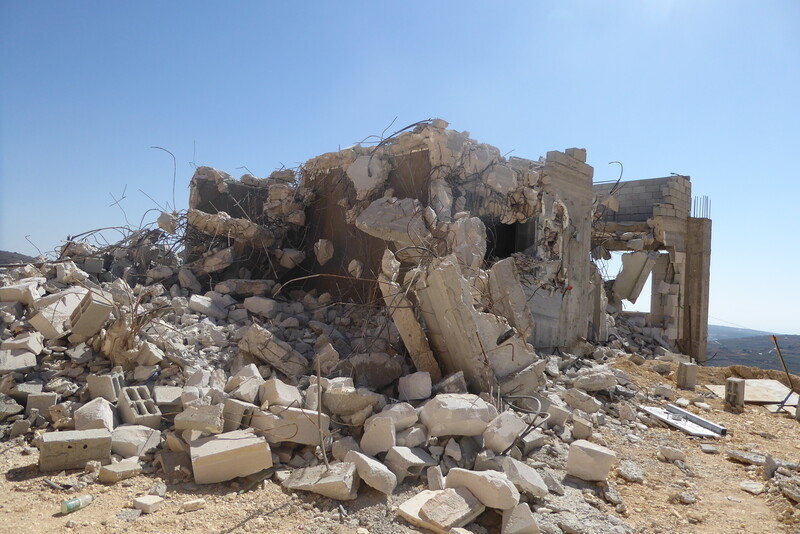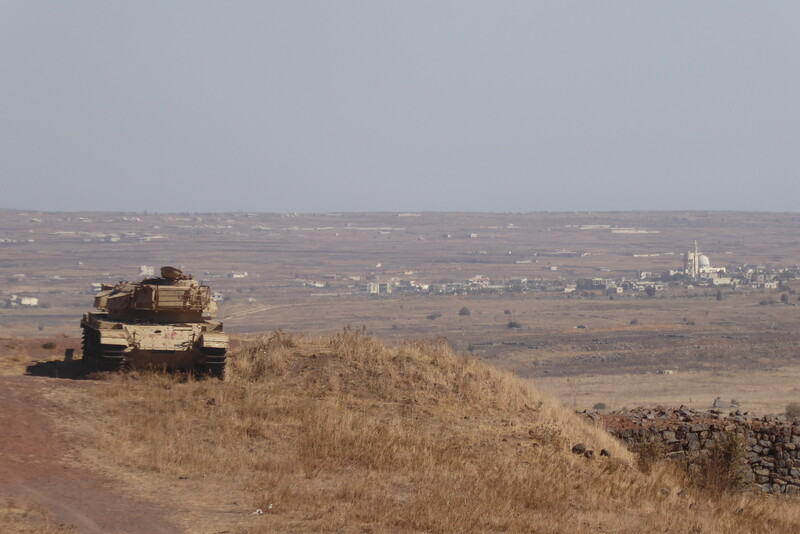The Electronic Intifada 11 November 2016

Israeli landmines in the occupied Golan Heights pose a lethal risk to farmers.
“Listen,” Salman Fakherldeen said. “Do you hear?”
Below the drone of a farmer’s tractor, the distant clatter of automatic gunfire steadily increased in volume and intensity.
Fakherldeen is an activist in the Israeli-occupied Syrian Golan Heights and a researcher with the Golan-based human rights center al-Marsad. Martial beret screwed down over his head, he paused for thought as he smoked a cigarette, watching shells explode on the Syrian plains beyond the demilitarized zone.
“The only winners now are [Bashar] Assad and the Israelis,” he said. “And in the end, Assad will lose as well.”
The equation leaves only one victor – and the Golan Heights are the spoils of war. As fighting tears its once stable if hostile northern neighbor apart, Israel is using the specter of the Islamic State group and Islamist militancy to seek international recognition for its annexation of the area, occupied since 1967.
Benjamin Netanyahu, the Israeli prime minister, thus chose last year to declare that the Golan Heights will “forever remain in Israeli hands,” taking full advantage of the chaos in Syria to openly challenge international law.
“The time has come, after 40 years, for the international community to finally recognize that the Golan Heights will remain forever under Israeli sovereignty,” he said.
Naftali Bennett, Israel’s education minister, also made a play for the annexation of the Golan to be internationally recognized, specifically citing the threat of Islamic State. The Golan, he said, was the only thing preventing Islamic State fighters from “swimming in the Galilee.”
Consolidating the occupation
Such words have been followed by specific policies to consolidate Israel’s grip on the territory: a planned fivefold increase in the number of settlers, a $108 million cash injection into 750 new Israeli agricultural projects, and a significant military expansion along the boundary between Syria and the territory under Israeli control.
As recently as 26 October, the Israeli government gave the go-ahead for the construction of 1,600 new homes in the settlement of Katzrin. The town’s 8,000 settlers live on ground once home to Syrian villagers, their property razed during the 1967 war.
To Faisal, a farmer in the Golan whose vineyard adjoins the United Nations- patrolled demilitarized zone and who spoke on condition that his full name would not be used, the issue is not the border. These days, he observed, “everybody lives near a border.”
Faisal is more concerned with Israeli policies allowing settlers access to up to five times more water than the Golan’s indigenous Syrian Druze, a minority religious group, and harsh restrictions on building projects.

In September, Israel demolished a Syrian home in the occupied Golan Heights for the first time in decades.
“It’s been 40 years and we’re still not allowed to build,” he said. “We are farming with love, not money: it’s impossible. How can you continue to live on this land?”
In September, for the first time in decades, Israel implemented a home demolition policy in the Golan more commonly associated with its practices in the occupied West Bank.
A candy-coloured Druze flag now flaps over the remains of Bassam Ibrahim’s home on a promontory overlooking Majdal Shams, the largest Syrian town in the occupied Golan. Bulldozed by Israeli police, it is now just a heap of rubble and twisted metal.
And al-Marsad reports that there are now more than 80 homes scheduled to be destroyed, as native Syrians find it difficult or impossible to secure building permits.
“My son lives with me, he’s 28,” Faisal said. “And I thank God that he hasn’t found a wife yet. Where would they go? Where would they live?”
Something like Islamic State
Israeli designs on the Golan are no secret, but are often wrapped in seemingly innocuous language.
Last year, Israel presented itself as a concerned protector of the Druze on the Syrian side of the 1967 boundary from the threat of Islamist militants.
Reuven Rivlin, Israel’s president, aired these concerns after Druze citizens of the state had voiced fears for their coreligionists in Syria. But Faisal said he did not believe Israel cares about protecting him from Islamic State fighters or anyone else.
“The Israeli state takes care of Jews, not Arabs,” he said. He pointed out that Israeli landmines around his home force him to work a scrap of poor-quality land beside the boundary.
A massive landgrab around Majdal Shams is marketed as an apolitical act of ecological largess.
But Naftali Bennett’s remarks that the Syrian war is a “rare opportunity” for Israel to stake its claim on the “big mountain of the Golan” suggest a different motivation behind the Hermon National Park project.

An Israeli military vehicle sits on a bluff overlooking rebel-held territory in Syria.
Across the demilitarized zone, meanwhile, al-Marsad’s Fakherldeen pointed out border gates he alleged are used by Israel to systematically treat fighters from an al-Qaida offshoot group, smuggling them across the UN-patrolled boundary under cover of darkness.
Though Fakherldeen opposes the Assad government in Syria, he was emphatic in his condemnation of Israel’s touted humanitarian efforts in the region: “I do not thank them for it,” he said. “If they truly cared they would take some refugees. Instead they push them back.”
“Syria will collapse, and Israel will demand to keep control over the Golan – and maybe even more than that,” Fakherldeen argued.
Israel’s posture as a politically exceptional actor in the region, moreover, mirrors the exclusivist theology of Islamic State, Fakherldeen said.
“Israel says it’s the only democracy, it’s the only liberal state in the Middle East. But really it’s something like Daesh,” he said, using the Arabic acronym for Islamic State.
Matt Broomfield is a freelance journalist currently working in occupied Palestine. He regularly reports for the Independent and writes for VICE, Dazed and activist media, as well as publishing poetry and fiction. Twitter: @hashtagbroom. Website: mattbroomfield.contently.com





